Topics
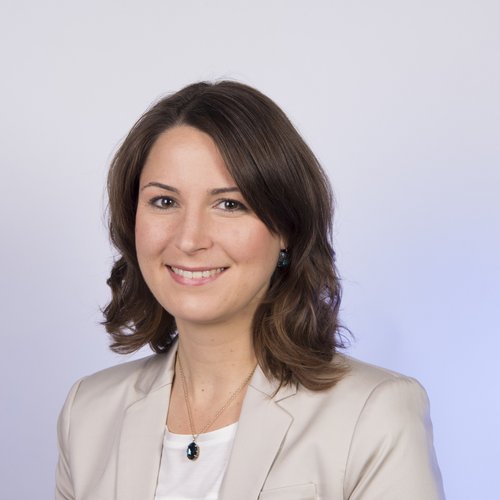
Dr. Regina Flake
Senior Economist for Education and Training, Skilled Manpower Assurance and International Vocational Training Research and Team Leader KOFA
Tel: +49 221 4981-840 Mail: flake@iwkoeln.de- Joined the German Economic Institute in 2013
- Studied International Economics at universities in Göttingen (Germany), Fontainebleau (France) and Puebla (Mexico), and gained a doctorate from the Ruhr Graduate School in Essen.
- Project Kompetenzzentrum Fachkräftesicherung
Research unit
IW Publications
Flake, Regina / Koneberg, Filiz / Risius, Paula, 2022, Lernrückstände durch Corona in der dualen Ausbildung. Die Bedeutung von Distanzlernen und Unterstützungsmaßnahmen der Ausbilderinnen und Ausbilder, IW-Report, Nr. 52, Köln
Zur Studie
Flake, Regina / Janßen, Simon / Leschnig, Lisa / Malin, Lydia / Seyda, Susanne, 2021, Berufliche Weiterbildung in Zeiten von Corona. Kein dramatischer Einbruch, aber deutliche gruppenspezifische Unterschiede, IW-Report, Nr. 43, Köln
Zur Studie
(in cooperation with David Meinhard, Dirk Werner)
Digitalisierung in der dualen Berufsausbildung – Umsetzungsstand, Modernisierungs- und Unterstützungsbedarf in Betrieben
IW-Trends 2/2019
(in cooperation with Alexander Burstedde, Paula Risius)
Fachkräfteengpässe in Unternehmen - Kleine und mittlere Unternehmen finden immer schwerer Fachkräfte und Auszubildende
KOFA-Studie im Auftrag des Bundesministeriums für Wirtschaft und Energie, 2018
https://www.iwkoeln.de/fileadmin/user_upload/Studien/Gutachten/PDF/2018/IW-Gutachten_KOFA_KMUs_finden_immer_schwerer_Fachkraefte_und_Azubis.pdf
(in cooperation with Susanna Kochskämper, Paula Risius, Susanne Seyda)
Fachkräfteengpass in der Altenpflege – Status quo und Perspektiven
IW-Trends 3/2018
(in cooperation with Lydia Malin, Paula Risius)
Einflussfaktoren der Bildungsentscheidung von Abiturienten für Ausbildung oder Studium
IW-Trends 3/2017
(in cooperation with Svenja Jambo, Sarah Pierenkemper, Paula Risius, Dirk Werner)
Beschäftigung und Qualifizierung von Flüchtlingen in Unternehmen – Die Bedeutung von Unterstützungsangeboten bei der Integration
IW-Trends 2/2017
(in cooperation with Dirk Werner, Michael Zibrowius)
Fortbildungsabsolventen – Arbeitsmarktergebnisse und Karriereperspektiven
IW-Analysen – Forschungsberichte Nr. 111, Köln 2016
(in cooperation with Dirk Werner, Michael Zibrowius)
Karrierefaktor berufliche Fortbildung – Einkommensperspektiven von Fortbildungsabsolventen
IW-Trends 1/2016
(in cooperation with Lydia Malin, Lena Middendorf, Susanne Seyda)
Qualifizierung von An- und Ungelernten – Eine empirische Bestandsaufnahme der Lebenssituation und Potenziale
IW-Analysen – Forschungsberichte Nr. 100, Köln 2014
Expertises
(in cooperation with Lydia Malin, Anika Jansen, Susanne Seyda)
Fachkräftesicherung in Deutschland – diese Potenziale gibt es noch
Studie für das Kompetenzzentrum Fachkräftesicherung (KOFA), 2019
(in cooperation with Susanne Seyda, Dirk Werner)
Mit beruflicher Weiterbildung die Digitalisierung meistern. Ergebnisse der repräsentativen Unternehmensbefragung im Rahmen des IW-Personalpanels 2018, Köln
Studie für DIHK-Bildungs-GmbH, 2019
(in cooperation with David Meinhard, Christoph Metzler, Valerie Müller, Susanne Seyda, Dirk Werner)
Mit beruflicher Weiterbildung die Digitalisierung meistern. Was IHK, IHK-Bildungszentren und DIHK-Bildungs-GmbH für Unternehmen anbieten und als Umsetzungspartner leisten können, Köln
Studie für DIHK-Bildungs-GmbH, 2019
(in cooperation with Anika Jansen, Lydia Malin)
Wie Unternehmen Beschäftigungspotenziale von Frauen noch besser nutzen können - Flexible Arbeitszeitmodelle ermöglichen Frauen den Schritt in Männerberufe
Studie für das Kompetenzzentrum Fachkräftesicherung (KOFA), 2019
(in cooperation with Alexander Burstedde, Paula Risius)
Fachkräfteengpässe in Unternehmen – Kleine und mittlere Unternehmen finden immer schwerer Fachkräfte und Auszubildende
Studie für das Kompetenzzentrum Fachkräftesicherung (KOFA), 2018
(in cooperation with Svenja Jambo, Markus Körbel, Susanne Seyda, Daniel Wörndl, Michael Zibrowius)
Promoting Social Partnership in Employee Training
Gutachten, 2018
(in cooperation with Alexander Burstedde, Lydia Malin, Paula Risius, Dirk Werner)
Fachkräfte für die digitale Transformation – Arbeitsmarktsituation und Gestaltungsmöglichkeiten
Gutachten für die Stiftung Familienunternehmen
(in cooperation with Lydia Malin, Paula Risius)
Ausbildung oder Studium? – Wie Unternehmen Abiturienten bei der Berufsorientierung unterstützen können
Studie für das Kompetenzzentrum Fachkräftesicherung (KOFA), 2017
The Role of the Private Sector in Vocational and Educational Training
EPF Policy Paper, Expertise for the Economic Policy Forum, 2017
(in cooperation with Svenja Jambo, Sarah Pierenkemper, Beate Placke, Dirk Werner)
Engagement von Unternehmenbei der Integration von Flüchtlingen – Erfahrungen, Hemmnisse und Anreize
Studie für das Kompetenzzentrum Fachkräftesicherung (KOFA), 2017
(in cooperation with Dirk Werner, Michael Zibrowius)
Karrierefaktor berufliche Fortbildung – Eine empirische Untersuchung der Einkommens- und Arbeitsmarktperspektiven von Fachkräften mit Fortbildungsabschluss im Vergleich zu Akademikern
Studie für die DIHK-Gesellschaft für berufliche Bildung – Organisation zur Förderung der IHK-Weiterbildung mbH, 2016
(in cooperation with Sara-Julia Blöchle, Tarrin Khairi-Taraki, Markus Körbel, Sarah Pierenkemper, Corinna Rauland, Dirk Werner, Daniel Wörndl)
Berufsausbildung für Europas Jugend – Voneinander lernen, miteinander gestalten
Studie zusammen mit der Hans-Böckler-Stiftung, der Konrad-Adenauer-Stiftung und der Vodafone Stiftung Deutschland, 2015
(in cooperation with Sebastian Bußmann, Susanne Seyda)
Fachkräfteengpässe in Unternehmen – Unternehmen steigern Ausbildungsangebote in Engpassberufen
Gutachten für das Bundesministerium für Wirtschaft und Energie, 2014
External Publications
(in cooperation with Susanne Seyda)
Betriebliche Weiterbildung in Europa: Die Rolle der Sozialpartner, Best Practices und die digitale Herausforderung
Handbuch der Aus- und Weiterbildung, Aktualisierungslieferung Nr. 308, Februar 2019
(in cooperation with David Meinhard)
Digital Transformation and E-Learning in Initial and Continuing VET of German Companies
Association for the Advancement of Computing in Education (AACE) (Hrsg.): Proceedings of E-Learn: World Conference on E-Learning in Corporate, Government, Healthcare, and Higher Education, 2018 in Las Vegas, NV, United States, Chesapeake, Vereinigte Staaten, S. 1057–1062
(in cooperation with Svenja Jambo)
Flüchtlinge integrieren - Chancen, Herausforderungen und Unterstützungsmöglichkeiten für Unternehmen
Frintrup, Andreas (Hrsg.): Berufliche Integration von Flüchtlingen und Migranten - Psychologische Kompetenzanalyse, rechtliche Rahmenbedingungen, Prozessgestaltung & Praxisbeispiele, Springer-Verlag, Köln, 2017, S. 117–138
(in cooperation with Lydia Malin, Lena Middendorf, Susanne Seyda)
Lebenssituation und Potenziale An- und Ungelernter
Britta Matthes, Eckhart Severing (Hrsg.): Berufsbildung für Geringqualifizierte – Barrieren und Erträge, AGBFN/BIBB, S. 13–29
(in cooperation with Susanne Seyda)
Fachkräfteengpässe und Handlungsoptionen für Unternehmen
Handbuch für Aus- und Weiterbildung, Aktualisierungslieferung Nr. 293, 2017
(in cooperation with Michael Zibrowius)
Was Betriebe an Fachkräften mit Fortbildungsabschluss schätzen und wie sie diese unterstützen können
BWP - Berufsbildung in Wissenschaft und Praxis, 46. Jg., Heft 5, 2017, S. 18–22
(in cooperation with Michael Zibrowius)
Fortbildung zahlt sich aus
IHK Wirtschaftsforum, Heft 11, 2016, S. 40–41
(in cooperation with Dirk Werner, Michael Zibrowius)
Aufstiegsfortbildung – Studie „Karrierefaktor Fortbildung“
Wirtschaft am Bayerischen Untermain, Zeitschrift der IHK Aschaffenburg, 2016, S. 14-16
(in cooperation with Dirk Werner, Michael Zibrowius)
Karrierefaktor Aufstiegsfortbildung. Akademiker vs. Fortbildungsabsolventen: andersartig, aber gleichwertig?
Berufliche Bildung, 26. Jg., Heft 1, Hamburg, 2016, S. 24–25
(in cooperation with Dirk Werner)
Wie attraktiv ist eine Ausbildung im europäischen Vergleich?
Christine Henry-Huthmacher, Elisabeth Hoffmann (Hrsg.): Duale Ausbildung 2020 – 19 Fragen & Antworten, Band II, Konrad-Adenauer-Stiftung, St. Augustin, S. 74–77
(in cooperation with Dirk Werner, Michael Zibrowius)
Duale Ausbildung in Deutschland: Handlungsfelder für das Ausbildungsmarketing
Christoph Beck, Stefan F. Dietl (Hrsg.): Ausbildungsmarketing 2.0 – Die Fachkräfte von morgen ansprechen, gewinnen und binden, Köln, 2014, S. 91–104
Gender Differences in the Earnings Mobility of Migrants
LABOUR: Journal of Labour Economics and Industrial Relations, Volume 27, Issue 1 (2013), S. 58–79
(in cooperation with Thomas K. Bauer, Mathias G. Sinning)
Labor Market Effects of Immigration – Evidence from Neighborhood Data
Review of International Economics, Volume 21, Issue 2, S. 370–385
More from Dr. Regina Flake
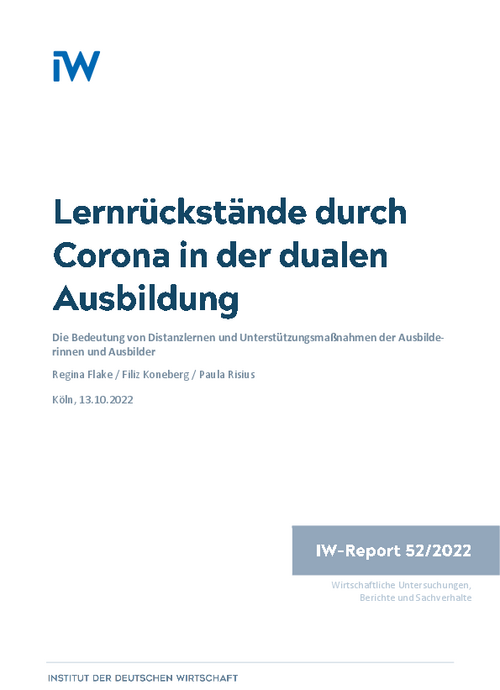
Learning deficits due to Corona in dual training
The contact reduction measures during the Corona pandemic had a strong impact on everyday life in the German dual system of vocational training. Regarding the work-based training within the companies, the question arises as to which extent distance learning and remote working could be organized at short notice for the apprentices.
IW
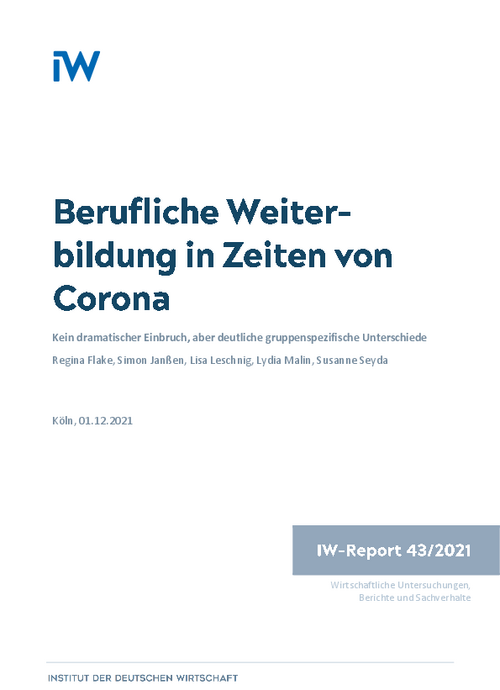
Professional Training in times of Corona
Despite the corona-related contact restrictions, participation in continuing vocational education and training (CET) had not declined massively by summer 2020. This is because a large part of the measures could still take place thanks to corresponding digital offers. However, there are significant differences depending on the employment sector, qualification level, gender and number of children of the participants in CET.
IW
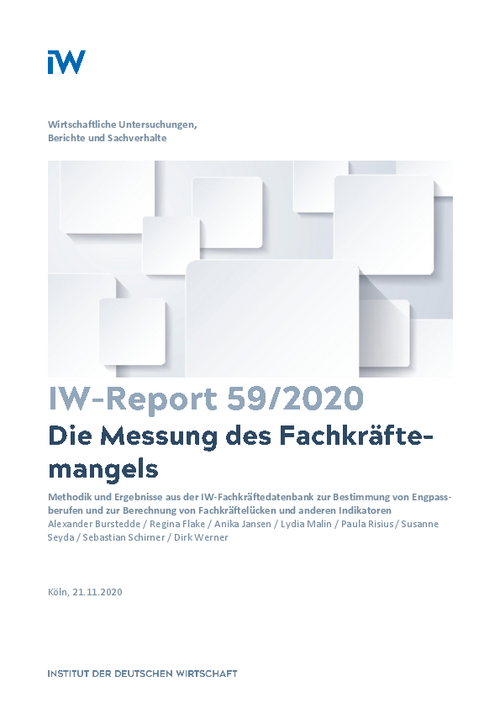
Measuring the shortage of skilled workers
The present IW-Report introduces a new methodology for measuring the shortage of skilled workers and thus makes a central contribution to mapping the skilled worker situation in Germany. First, a definition of the term "shortage of skilled workers" is presented. Afterwards, its operationalization is discussed.
IW
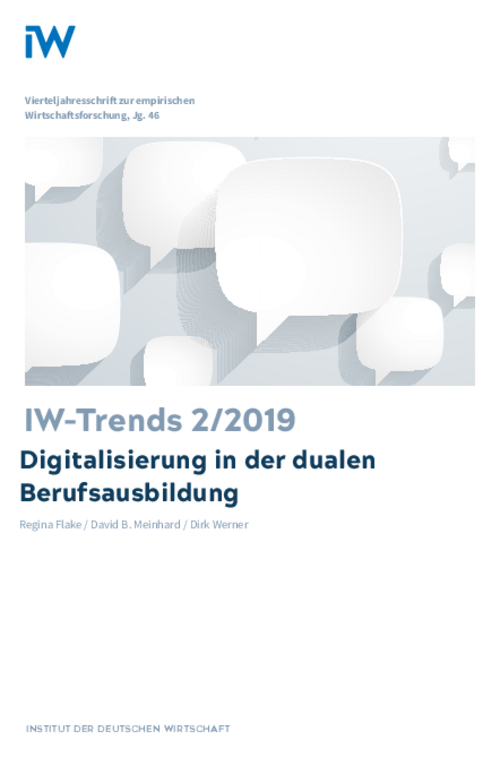
Digitalisation in Dual Vocational Training
This paper analyses the impact of the digital transformation on training activities in German enterprises.
IW

Promoting Social Partnership in Employee Training
In the wake of global trends like the digitalisation of the economy, employees are faced not only with higher demands for competences but also with the requirement to continuously adapt and further develop their skills to maintain their employability. This study was conducted on behalf of the European social partners, ETUC, BusinessEurope, CEEP and UEAPME, with financial support of the European Commission.
IW
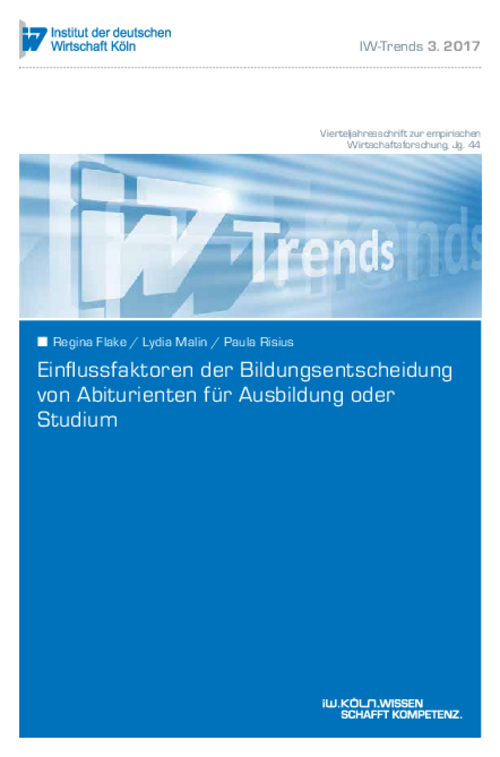
How High School Graduates Decide Between a University Course and Vocational Trai
The proportion of school students who take and pass the German Abitur exams (equivalent to British ‘A’-levels or the American high school diploma) has been increasing for many years.
IW

Employment and Training of Refugees in Companies
Approximately every sixth enterprise in Germany already employs refugees as trainees, interns or permanent staff. Of these, smaller trades and skilled crafts firms are making a particularly large contribution to integration.
IW

The Role of the Private Sector in Vocational and Educational Training
Even though the four analysed countries are very different in terms of their starting points and their demographic, economic and institutional framework conditions, they all face the same challenge: designing a vocational education and training system that makes the country future-proof.
IW

New Skills Agenda of the European Commission: Brush up the image of vocational training
The European Vocational Education and Training (VET) Week is designed to make vocational training more attractive. The dual system in Germany can serve as a model for countries with high youth unemployment.
IW
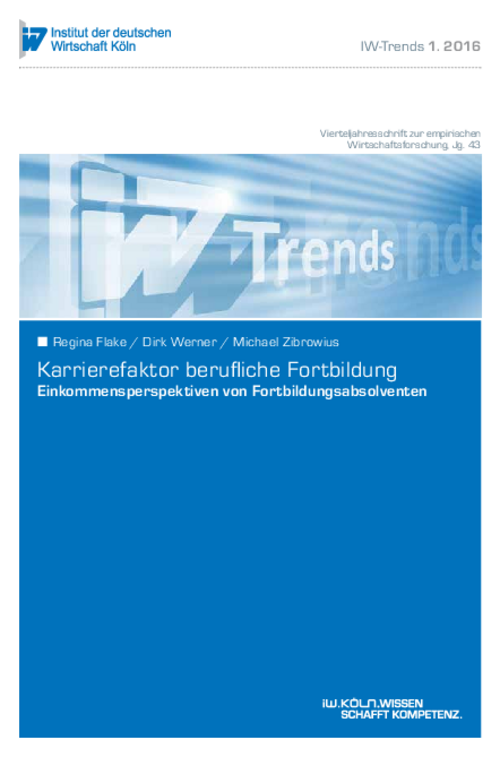
Further Vocational Training as a Career Factor
The Income Prospects of Employees with Advanced Vocational Qualifications
IW